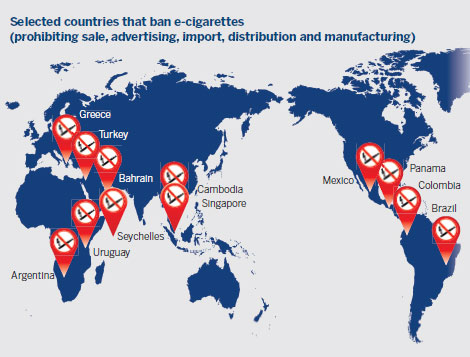And you thought tobacco was toxic?
Updated: 2016-03-01 09:56
(HK Edition)
|
|||||||
Tests by Hong Kong Baptist University (HKBU) show controversial e-cigarettes, pushing hard for admission into the Hong Kong market, contain deadly chemicals.
The polycyclic aromatic hydrocarbons (PAHs), among other toxins found in the samples tested, are derived from petroleum hydrocarbon contamination and the burning of other organic materials known as carcinogens. Inhaling carcinogens could lead to malformation of human tissue, potentially leading to cancer.
The result showed that the highest level of PAHs concentration in fumes rising from a concentrated solution reaches 504.5 nanograms/ml, almost 1 million times more concentrated than its presence in Hong Kong's outdoor urban environment.
Tested e-cigarettes were also found to contain high amounts of polybrominated diphenyl ethers (PBDEs). PBDEs create a risk of disruption of thyroid hormones and reduced fertility. They also pose risks for fetal development and may cause cancers.
This is the first time electronic cigarettes have been scientifically proven to contain PBDEs, said Chung Shan-shan, assistant professor of Croucher Institute for Environmental Sciences from HKBU.
The discovery hints that other harmful substances, which may have been ignored in previous studies, will be found in the future, Chung added.
This is a "clear sign" that e-cigarettes affect human health, said Lam Tai-hing, chair professor of Community Medicine in the School of Public Health, the University of Hong Kong. The Council urges the government to ban e-cigarettes.
"The more you look into it, the more problems are indicated," Lam said, citing that quick changes in technology have resulted in more variations of e-cigarettes in terms of temperature, chemical components and so on.
The Hong Kong Council on Smoking and Health also released a survey conducted by the School of Public Health at the University of Hong Kong to monitor the prevalence of e-cigarettes use.
The survey shows that smokers in the age group of 15 to 29 comprised the biggest chunk (7.9 percent) of e-cigarette smokers.
The study is alarming and is a step forward on extending our understanding on those potentially cancer-causing substances in e-cigarettes, said Judith Mackay, director of the Asian Consultancy on Tobacco Control.
"It clearly sends out the message that e-cigarettes need strict regulation before there is a clear and comprehensive understanding on what they contain, how they work, how dangerous they are, particularly to pregnant women and young people," Mackay said.

(HK Edition 03/01/2016 page11)